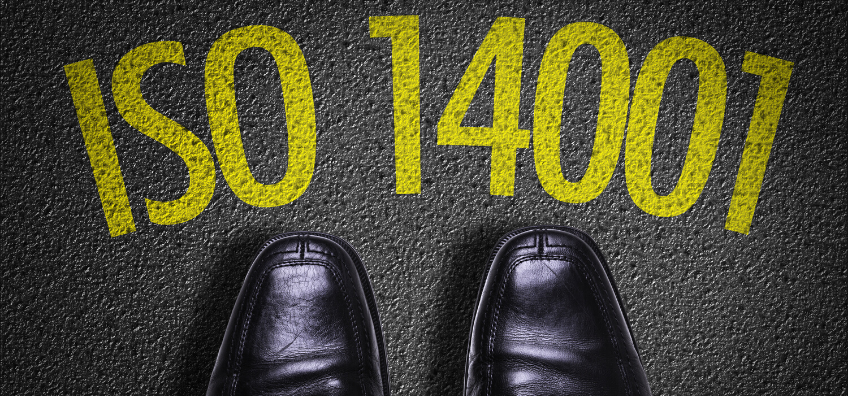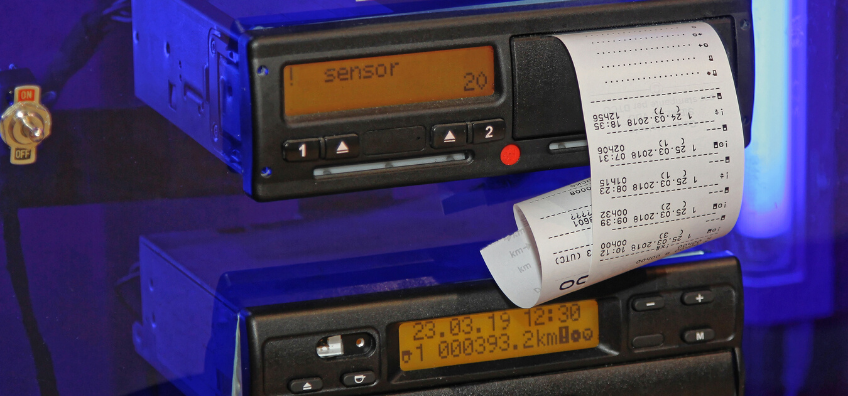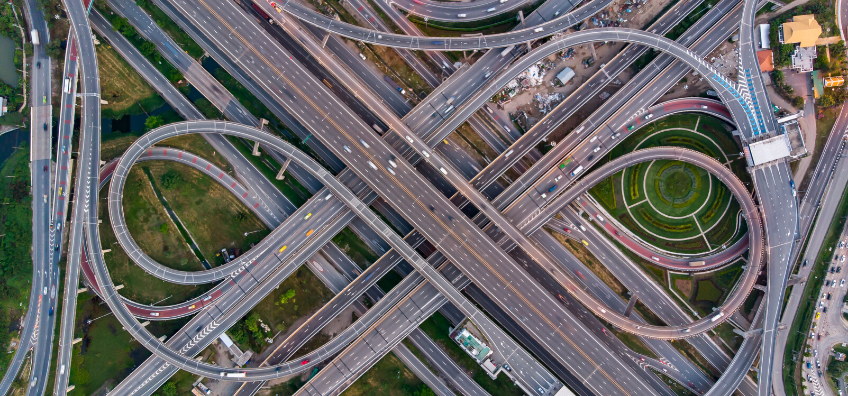Environmental Management System in a transport company
07/01/2020

The PN-EN ISO 14001:2015 standard is aimed at supervising the impact a business has on the natural environment and, if possible, limiting any negative impact in this regard. How is this standard implemented in a transport company?
Firstly, it is necessary to determine the scope of the system’s implementation. The 8 points presented below describe the areas which require your attention:
- Identifying environmental aspects.
- Determining which legal and other requirements concern the specific environmental aspects.
- Determining vital environmental aspects.
- Designating operational control for vital environmental aspects.
- Implementing operational control.
- Relaying information on vital environmental aspects outside the company.
- Identifying potential hazardous situations and breakdowns that can negatively impact the environment and working to resolve such issues.
- Determining the course of action in case of hazardous situations and breakdowns which can negatively impact the environment, as well as the way of responding to them.
- Identifying environmental aspects.
It consists in identifying environmental aspects that the organisation can influence and oversee.
The following factors should be considered when doing so:
- air emissions,
- discharges to water,
- waste management methods,
- soil pollution,
- raw material, energy and natural resource usage,
- other issues related to the local environment and society.
Possiamo organizzare qualsiasi
trasporto in 45 minuti
o meno
Il nostro dipendente preparerà rapidamente una proposta concreta, e dopo averla approvata, si assicurerà personalmente che nulla impedisca la consegna in tempo.
Gli ordini urgenti non ci sorprendono, perché siamo ben preparati.
Examples of environmental aspects that transport companies must consider include noise, discharge of sewage and emission of dust and gas pollutants into the air.
- Determining which legal and other requirements concern the specific environmental aspects.
Any individual obligations result from specific legal provisions. As such, in order to effectively implement an Environmental Management System, companies must strictly adhere to the following legal provisions:
Polish provisions:
- Act of 14 December 2012 on waste (UOO).
e.g. ‘Waste may only be transported by an entity holding a transport permit.’
- Regulation of the Minister of the Environment of 9 December 2012 on the waste catalogue.
e.g. ‘Waste classification consists in assigning waste to the relevant group.’
- Act of 20 May 1971 – The Code of Offenses (KW).
e.g. ‘Waste ought to be collected selectively.’
- Act of 13 September 1996 on maintaining cleanliness and order in municipalities (UUCPG).
e.g. ‘Property owners are obliged to have municipal waste containers and collect all waste selectively. They must also sign a waste collection agreement and retain invoices confirming waste collection.’
Possiamo organizzare qualsiasi
trasporto in 45 minuti
o meno
Il nostro dipendente preparerà rapidamente una proposta concreta, e dopo averla approvata, si assicurerà personalmente che nulla impedisca la consegna in tempo.
Gli ordini urgenti non ci sorprendono, perché siamo ben preparati.
- Ordinance of the Minister of the Environment of 14 November 2016 regarding the detailed scope of information contained in the report and the way it is to be entered into the National Database on Greenhouse Gases and Other Substances Emissions.
e.g. ‘Fire protection equipment and systems operators are required to submit annual reports containing information regarding the Operation Sheets and Fire Protection System Sheets maintained by them in a given calendar year.’
- Act of 27 April 2001 – Environmental Protection Law (EPL).
- Regulation of the Minister of the Environment of 13 December 2018 regarding the lists containing information and data on the extent to which the environment is utilised, as well as the amounts of fees due.
e.g. ‘Entities utilising the environment determine the amounts of fees due on their own and pay this amount to the account of the appropriate Marshall’s Office. If the amounts of fees do not exceed PLN 800, no fees shall be paid to the Marshall’s Office account, but a report must still be submitted. If the amounts of fees do not exceed PLN 100, it is not necessary to submit a report.’
- Regulation of the Council of Ministers of 22 December 2017 on fee unit rates for utilising the environment.
- Act of 25 February 2011 on chemical substances and their mixtures (USCIM).
e.g. ‘Containers and tanks used for storing hazardous substances or their mixtures, as well as containers and tanks used for working with such substances or mixtures (…) should bear appropriate markings, including warning signs.’
- Act of 15 May 2015 on substances that deplete the ozone layer and on certain fluorinated greenhouse gases (ODS).
e.g. ‘The operator is obliged to exercise effective control over the technical functioning of fire protection devices or systems (…)’.
EU regulations:
Possiamo organizzare qualsiasi
trasporto in 45 minuti
o meno
Il nostro dipendente preparerà rapidamente una proposta concreta, e dopo averla approvata, si assicurerà personalmente che nulla impedisca la consegna in tempo.
Gli ordini urgenti non ci sorprendono, perché siamo ben preparati.
- Regulation (EC) No 1907/2006 of the European Parliament and of the Council of 18 December 2006 concerning the Registration, Evaluation, Authorisation and Restriction of Chemicals (REACH), establishing a European Chemicals Agency, amending Directive 1999/45/EC and repealing Council Regulation (EEC) No 793/93 and Commission Regulation (EC) No 1488/94 as well as Council Directive 76/769/EEC and Commission Directives 91/155/EEC, 93/67/EEC, 93/105/EC and 2000/21/EC,
- REGULATION (EC) No 1005/2009 OF THE EUROPEAN PARLIAMENT AND OF THE COUNCIL of 16 September 2009 on substances that deplete the ozone layer Regulation 842/2006.
- REGULATION (EC) No 842/2006 OF THE EUROPEAN PARLIAMENT AND OF THE COUNCIL of 17 May 2006 on certain fluorinated greenhouse gases.
- Determining vital environmental aspects.
In order to be considered vital, an environmental aspect must meet at least two of the following criteria:
- there exists a general legal regulation (e.g. law, ordinance) concerning this aspect
- the environmental aspect has a significant impact on the environment (e.g. hazardous waste, industrial wastewater)
- handling such an aspect is expensive
Each individual criterion is rated on a 1-3 scale. The sum of all scores provides an assessment of the aspect’s significance.
The following criteria must be evaluated:
- the level of negative environmental impact (1-3)
- event frequency (1-3)
- environmental impact (1-3)
- formal and legal situation (1-3)
- environmental commitment costs (1-3)
Therefore, the minimum rating is 5 and the maximum is 15. An aspect is considered vital when the sum of all ratings is equal to or greater than 9.
- Designating operational control for vital environmental aspects.
Operational control documentation that defines key operational characteristics and criteria is established for designated vital environmental aspects.
- Implementing operational control.
If justified, the operational control documentation may consist of:
- a device or installation operation manual
- and/or OHS, fire protection instructions, supervised in accordance with the PR01 procedure – ‘Supervision of documentation and records’,
- and/or a Management System procedure supervised in accordance with the PR01 procedure – ‘Supervision of documentation and records’
- or other documents such as contracts, specifications or decisions and permits issued by the relevant authorities.
- Relaying information on vital environmental aspects outside the company.
Information on environmental aspects, including vital environmental aspects, may only be relayed outside the company in order to be delivered to the relevant authorities, provided that legal requirements necessitate this.
Possiamo organizzare qualsiasi
trasporto in 45 minuti
o meno
Il nostro dipendente preparerà rapidamente una proposta concreta, e dopo averla approvata, si assicurerà personalmente che nulla impedisca la consegna in tempo.
Gli ordini urgenti non ci sorprendono, perché siamo ben preparati.
In case of questions, comments and complaints regarding vital environmental aspects, any relevant information must be provided by the appropriate person, appointed within the organisation.
- Identifying potential hazardous situations and breakdowns that can negatively impact the environment and working to resolve such issues.
The organisation is required to identify events which may impact the environment. Such events include equipment failure, fire, power outage, chemical substance pollution, etc.
- Determining the course of action in case of hazardous situations and breakdowns which can negatively impact the environment, as well as the way of responding to them.
Emergency preparedness and response procedures should include such elements as:
- description of the facility, process, installation, device and place,
- description of the breakdown,
- threat types,
- preventive actions, including:
- constant control of the devices’ and installations’ technical condition,
- collaborating with maintenance services,
- operating in accordance with health and safety and fire protection regulations,
- quick troubleshooting,
- maintaining fire protection equipment, installations and other such devices in good condition,
- procedures for dangerous situations and breakdowns, including but not limited to (if applicable):
- notification signal about a breakdown,
- procedures for evacuation and saving people,
- notifying relevant persons, services and institutions, depending on the nature and consequences of the accident,
- frequency of breakdown simulations (if possible).
Once all dangerous events and accidents impacting the environment are resolved, the Management System Representative and the Health and Safety Specialist analyse their causes and effects and determine any necessary corrective actions.
Lastly, there is also the matter of reporting. The following types of reports are crucial for any transport company:
Possiamo organizzare qualsiasi
trasporto in 45 minuti
o meno
Il nostro dipendente preparerà rapidamente una proposta concreta, e dopo averla approvata, si assicurerà personalmente che nulla impedisca la consegna in tempo.
Gli ordini urgenti non ci sorprendono, perché siamo ben preparati.
- 28 February – National Centre for Emissions Management Reports – submitted by entities that release gases or dust into the air. This type of report concerns the entire previous year and contains such information as the volume of greenhouse gas emissions and other substances released into the environment, production volume and detailed information on raw materials and fuels which accompany emissions, information on technical measures aimed at preventing or minimising emissions, information on emissions that were reduced as a result of the measures taken, as well as the time period in which such reductions were achieved, as well as planned dates of new activities and the amounts of greenhouse gas emissions resulting from them. Reports are submitted electronically via a personal profile on the website of the National Centre for Emissions Management, according to the template available on the platform.
- 15 March – a report on waste held (for the previous year) – if applicable. This document must be submitted to the Marshall’s Office.
- 31 March – a list containing information on the annual fee for utilising the natural environment (for the entire previous year). Concerns discharge of gases or dust into the air, water extraction, storing waste and discharging sewage into water and soil. This list must be submitted to the Marshall’s Office of the Voivodeship in which the company utilises the natural environment. The list of gases and dust released into the air is an exception in this regard. Such a document must be submitted to the Marshal’s Office in the Voivodeship in which the submitting entity is registered.
- CRO – Central Operator Register (only for owners of refrigerated vehicles) – entries should be made after repairs, inspections and replenishing the refrigerant.
The ISO 14001 standard makes it possible to effectively prevent any environmental incompatibilities. Since having an environmental management system helps reduce the costs of waste and pollution removal, as well as lower the energy and raw materials consumption, energy costs and numerous fees associated with the use of environmental resources, it is clear that there are also certain economic benefits associated with introducing such a system.
In addition, implementing this type of standard makes it significantly easier to access programmes which can be used to obtain funding, e.g. EU subsidies or tenders.
It is, therefore, well worth it to analyse the implementation process, as it may just turn out that the benefits of introducing the ISO 14001 standard are significant enough to warrant investing time and money into doing so.


